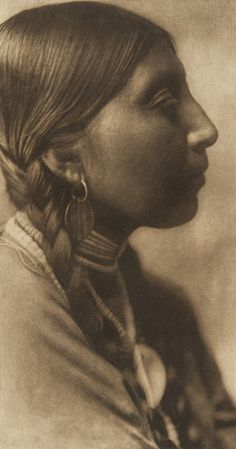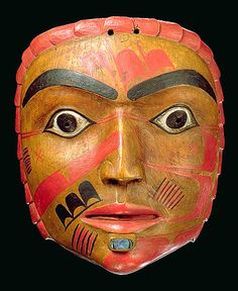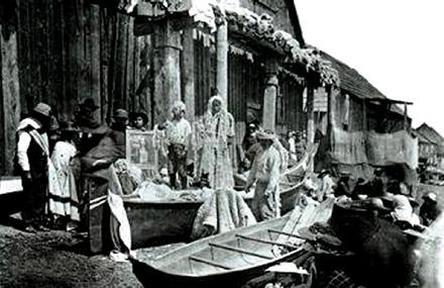|
"Reduced to this sad extremity, with death on the one side, and matrimony on the other, I thought proper to choose what appeared to me the least of the two evils, and consent to be married..." In a sudden crazy unexpected turn of events, John R. who had been plodding along day after day hoping and literally praying that a ship would arrive at Nootka Sound so that he and Thompson could be rescued and once again returned to life among their fellow Christians, was instead confronted by Maquina with this news: "He and his chiefs had held council and determined that I must marry one of their women... That I must consider myself as destined to pass the remainder of my life with them, that the sooner I conformed to their customs the better, and that a wife and family would render me more contented and satisfied with their mode of living. I remonstrated against this decision, but to no purpose, for he told me that should I refuse, both Thompson and myself would be put to death."  Young Wishram Indian Woman Young Wishram Indian Woman Could all this be true? Or is it some sort of elaboration to add interest to the story? What does John himself say about this marriage in his original text? Like all his journal entries, the references are sparse, and here are the first two of exactly three of them... September 10, 1804 This day our chief bought a wife for me, and told me that I must not refuse her, if I did he would have both Thompson and myself killed.... It is very much against my inclination to take one of these heathens for a partner, but it will be for my advantage while I am amongst them, for she has a father who always goes fishing, so that I shall live much better than I have at any time heretofore. September 20, 1804 We live a great deal better since I got married, for my wife's father is always fishing. I leave the reader to judge of my feelings at being forced to take an Indian for a wife. His feelings must have been very complicated. Meanwhile, the Narrative describes the marriage scenario with much more detail, presumably based on John's memory... According to the Narrative, Maquina gives John the choice of marrying someone from his own village or marrying outside the village. John chose to pick someone outside the village. And so arrangements having been made by Maquina, they travel to a neighboring village, where: "We were ushered in with much ceremony... and after having been regaled with a feast of herring spawn and oil, Maquina asked me if I saw any among the women who were present that I liked. I immediately pointed out to him a girl of about seventeen, the daughter of Upquesta, the chief... Her person was small but well formed as were her features... She would indeed have been considered as very pretty in any country. I found my Indian princess both amiable and intelligent, for one whose limited sphere of obervation must necessarily give rise to but a few ideas, she was extremely ready to agree to any thing that I proposed." I leave the reader to judge of my feelings on the merit of that statement! John as slave and at the same time husband of an Indian princess from another tribe surely had to keep his wits about him as he adjusted to a very fluid situation, the dynamics constantly shifting from one moment to the next. The one thing we know for sure is that while the marriage took place in September of 1804; by March of 1805, according to John's third and final entry in the Journal regarding this subject: March 21, 1805 Our chief gave me liberty to dispense with the girl that he had forced me to take for a partner, which I did with great satisfaction. So that presumably was that. But for one very important detail. Fast forward to the moment a few months later in July, when John is finally rescued and released. According to the Narrative, when he is taking his final leave of Maquina we get this bombshell: "Maquina enquired of me how many moons it would be before I should come back again to see him... saying that he would keep all his furs for me, and that as soon as my son, who was then about five months old, was of a suitable age to take from his mother, he would send for him, and take care of him as his own." Wow! A son??? According to Hilary Stewart: "This is the only reference Jewitt makes to having a child, who would have been about a month old at the time he and Thompson were rescued. His simple statement here gives no hint as to whether or not he had known of the birth before his rescue. The infant was born close to nine months after the marriage." So maybe marriage wasn't so bad for John after all!  Northwest Coast Haida Mask - courtesy of Canadian Museum of History Northwest Coast Haida Mask - courtesy of Canadian Museum of History The whole thing is somewhat shocking from the white man's point of view, but what about the Indian viewpoint? According to the Northwest Coast Indian heritage website Canada's First People's: "Marriages were always between people from different clans. When a man decided to marry a woman, he paid her father an agreed amount before the wedding. After the birth of the couple's first child (born into the mother's clan), the wife's clan paid her husband an amount equal to the initial wedding payment. After the payment, then the marriage was annulled and the woman could chose to stay with her husband or leave him." So although puzzling in terms of European social ways, John's story actually fits right into the Indian culture's scheme of things... once a child was born and the proper payment made, the marriage could be effectively ended... and life, such as it was for John, would go on.
0 Comments
|
Archives
July 2018
Links to Related Sites Lincolnshire Wildlife Trust Rod Collins - Lincolnshire Thro' History, Life, Lens and Words The Old Palace Lincoln - Elegant Bed and Breakfast National Portrait Gallery - London College of Arms The Jewett Family of America History and Geneaology of the Jewitts of America Jowett Variations Marvinas Bay Lodge First Peoples of Canada |
Jewitt-Pennock-Foster and Cool-VanPelt Family History Copyright © 2015

 RSS Feed
RSS Feed